The dairy, which once supplied over 11 lakh litres of milk daily, now provides a paltry 20,000 litres; is the gold mine of its sprawling land at Worli, Kurla and Goregaon the reason?
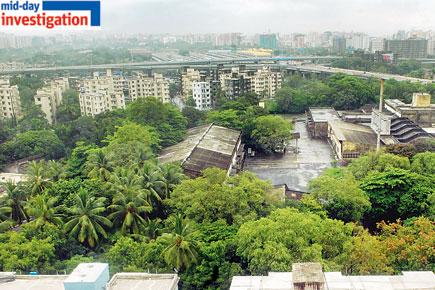
Is the state government out to devour its own milk-supplying unit and invite land sharks to the feast? The city’s only government-run milk supplier, Aarey dairy, is fighting a battle to stay afloat atop its rapidly vanishing production, but appears to be hurtling to its eventual decimation, with a lot of help (or lack thereof) from the government.
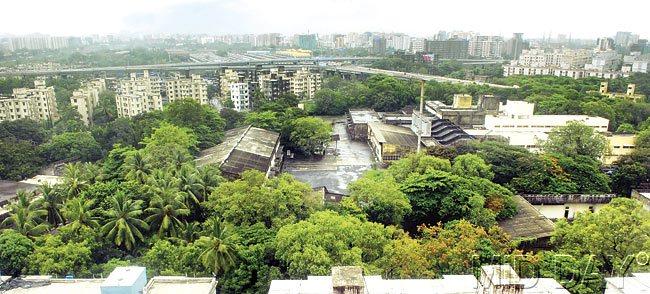
Aarey’s Kurla dairy is spread over 25 acres of land and infrastructural developments around it have bumped up the plot’s market value. Pics/Atul Kamble
ADVERTISEMENT
The dairy, which once supplied over 11 lakh litres of milk daily, now provides a paltry 20,000 litres, the first such low in its 45-year history. From the various facts and utterances of dairy employees, one can discern a picture in which the powers that be seem to be systematically enfeebling the unit to help themselves to a chunk of it — or rather, the gold mine of its sprawling land at Worli, Kurla and Goregaon.
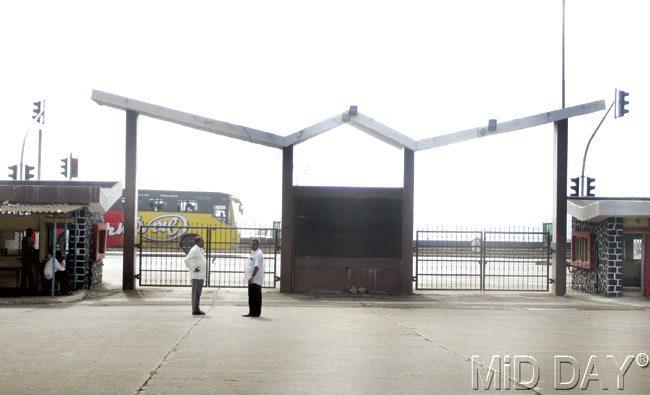
The Worli dairy is spread across 14 acres of prime sea-facing land with a market value of over Rs 3,000 crore
To wit, the Kurla dairy has been shut since February purportedly for overhaul of machinery. Hiring has been on hold for the last few decades and there are no signs of it resuming. From the dairy’s existing staff of 1,800, over 1,100 employees have been shown as surplus.
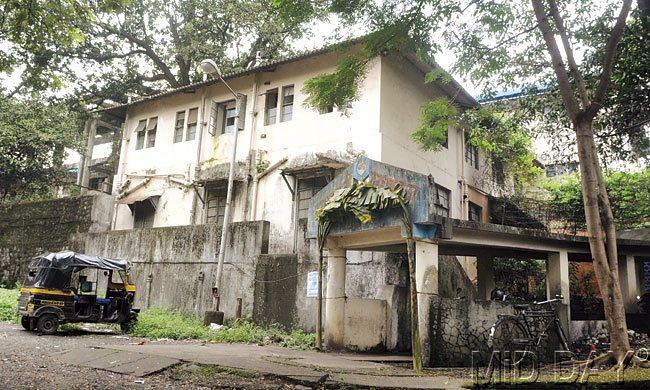
The Goregaon dairy land, which falls under a green zone, is home to a rich biodiversity of flora and fauna
Moreover, in the last three decades, modernisation has failed to touch dairy operations; its advertising funding has been stemmed; no measures have been taken to step up milk production, or even make it viable in the competitive market of today.
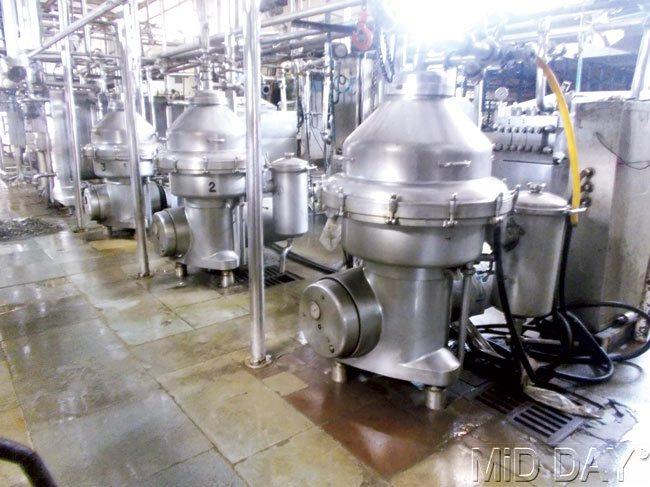
The cream separators at Kurla dairy have been defunct for years
To all intents, the dairy might as well be living in a time capsule. And the government’s unconcern vis-à-vis the situation has given credence to the fears of a conspiracy to let Aarey die a 'natural' death.
Sharks on prowl
For one, closure might mean megabucks for real estate developers ogling the sprawling Aarey plots at Kurla, Goregaon and, most importantly, Worli Sea Face.
Officials at the three dairy units claim that the Worli dairy — spread across 14 acres of prime sea-facing land with a market value of over R3,000 crore — is a particularly fat cash cow for builders. The Bandra Worli Sea Link has only enhanced the value of this property.
The units at Kurla and Goregaon are each spread over 25 acres of land, and while the former’s land can easily fetch R1,000 crore in the market, the latter, being in a Green Zone, cannot be used for commercial purposes.
Nonetheless, the state cabinet’s nod last week for conversion of agricultural land to non-agricultural land for urban development, without requiring the collector’s permission, would result in loss of this green belt, until now protected by environmental regulations.
Power plots
Vijay Sonawane, president of the Greater Mumbai Milk Scheme Workers Union, which is affiliated to the State Government Employees Federation, blamed politicians for the status quo.
“The people in power are trying to create a platform to attain their ulterior motives. By refusing to pump in funds into the dairy, they want to show that it s losses are piling up. The non-supply of milk would result in its closure, which would mean money running into several crores for developers.”
Sanjay Chaturvedi, editor of real estate publication Accommodation Times, said, “The government is exhibiting a political will to ensure the dairy dies a natural death, so the entire prime land is thrown open for the land sharks to grab.
While the Worli dairy can easily fetch over Rs 3,000 crore, the Kurla land can get over Rs 1,000 crore due to the newly constructed Santacruz-Chembur Link Road which passes through it. Its proximity to the Kurla railway terminus and the State Transport bus depot in Nehru Nagar only bumps up its value.”
Chaturvedi added, “The recent cabinet approval for conversion of agricultural land to non-agricultural land is a ploy to take over the Green Zone status of Aarey Goregaon for exploitation.”
Portending that the dairy might end up under the dust of history just like the city’s once-flourishing textile mills, he cautioned, “It is high time that Mumbaikars stand up to save Aarey dairy from land sharks, or it will meet the fate of Mumbai’s defunct mills’ land sooner or later.”
'It's the competition'
Politicians and Mantralaya officials wrote off concerns over any such conspiracy, ascribing the situation to a considerate government that wants to shield consumers from high milk prices.
Y E Kerure, dairy development commissioner, told mid-day that the supply of cow milk to the dairy has dried up since cooperatives are demanding higher prices for milk.
“We are still paying a procurement rate of Rs 20 per litre to the farmers, against the Rs 24-Rs 25/l at which private players buy from them. It is obvious that farmers will supply to the entity that pays them more. The selling price of Aarey milk is Rs 33/l, whereas private suppliers charge over Rs 40,” Kerure said.
He further said, “The moment the government increases procurement rate and tries to match it with that of private players, they, in turn, will raise their purchase rate, and this will only result in price hikes.”
'It's the netas'
But officials at Aarey dairy tell a different story. Requesting anonymity, some revealed that the problem would not have been caused had the high-power committee constituted during a cabinet meeting on July 2009 taken solid decisions on fluctuating milk prices.
The committee, which included senior officials from dairy and finance departments, failed to resolve the issue and stabilise milk prices. Moreover, the dairy officials rued, politicians from the ruling Congress-NCP alliance run most of the private dairies.
According to union leader Sonawane, “During monsoon, due to abundant grass for the cows to graze on, the milk yield should ideally expand. However, most cooperative societies are not supplying milk to the government-run dairy, as they prefer private dairies.”
Shashank Sutar, who heads the workers union at Kurla dairy, said, “If the procurement cost paid to farmers is raised and matched with the rate private players are paying, the supply to Aarey will improve drastically. And the consumers, who are already paying over Rs 40 to buy private brands, will not mind paying a similar price for Aarey.”
Full 'throttle'
According to dairy officials, politicians have let the dairy fall to decrepitude since this serves their personal interests. For the past 15 years, the government has not shelled out a paisa to fund advertising , a head which used to get Rs 80-Rs 90 lakh annually.
Recruitment has been in a freeze for decades. Earlier, the dairy employed over 13,000 people across the state. But the government proclaimed that the labour was surplus and whittled it, piecemeal, to a force of 4,000 at present.
Of these, over 80 per cent are set to retire over the next few years; this is interpreted by the unions as an oblique declaration of an impending closure, since no fresh recruitment is being made to replace the outgoing members.
“The surplus employees are in the 45-55 age group and more than 80 per cent are due for retirement in the next 5-10 years. We had mooted that the surplus staff should be absorbed by the dairy as replacements for those about to retire, but the government did not act on our request,” said Sonawane.
In Mumbai, the exodus is almost urgent. Of the present force of 1,800 dairy staffers here, nearly 500 will retire near the turn of this year.
With production slipping, the dairy carried out an internal assessment and found that over 1,100 of its employees were still in excess. The officials sought to clarify that those relieved from duty would be adjusted in other government departments. But it turned out to be more of a maladjustment.
Praful Bhadalekar, general secretary of the Worli dairy union, said, “Eight of our security guards were shunted and assigned jobs as housekeeping staff, bellboys, attendants and waiters in state guesthouses. All eight came back to the dairy a few months ago because they felt humiliated.”
In another, outlandish transfer, a bunch of mechanics from the dairy were assigned to the state Forensic Science Laboratory in Kalina. “They are used to spanners and hammers, but suddenly they are expected to handle glass test tubes and jars in a sophisticated lab. They are not used to working in such an environment and some have already returned to the dairy,” said Bhadalekar.
Moreover, the government intends to parcel off the dairy employees to places like Ratnagiri, Raigad, Sindhudurg, etc. It has failed to factor in that the house rent allowance of a government servant in Mumbai -- an A-plus grade city -- is 30% of the basic salary, while in rural areas, it is a mere 5%.
Screws loose
Officials were distraught that in an age of innovation, the dairy plants and machinery have not been upgraded for years, leading to its production capacity remaining grossly underused. In fact, the machinery, bought from Denmark nearly 45 years ago, has not seen an upgrade since the dairy’s inception. Most of the equipment at the three units has not even undergone servicing.
Officials said that the three cream separators at the Kurla dairy, each of which is currently valued at over Rs 2 crore, have not been functional for years.
Dairy union leader Sutar said, “In February, the only separator that was operational developed problems and the production shut down. Though a tender for repairs was floated in June, only one company came forward to fix the problem for R6 lakh. But the work has not been allotted, as the firm has not submitted a value-added tax certification to the dairy department.
A glycol-chilling machine worth Rs 60 lakh, bought in 2010, is yet to be installed at the Goregaon dairy. Similarly, a sleeving machine procured for Rs 10 lakh a year and half ago has been rusting away after a major component was stolen.
There are rumours that the state may bring in a third party, like the National Dairy Development Board, and appoint consultants to review the capacity of all the three dairies. With a view to “modernise” operations, they may close down one of the dairies and sell off the prime land for commerce.
 Subscribe today by clicking the link and stay updated with the latest news!" Click here!
Subscribe today by clicking the link and stay updated with the latest news!" Click here!







